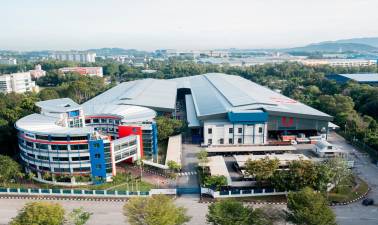SHAH ALAM: Homegrown building materials wholesaler and distributor Unitrade Industries Bhd welcomes the launch of the Malaysia Steel Industry Roadmap 2035 (SIR2035) by the Ministry of Investment, Trade and Industry (Miti), stating that the roadmap charts a clear path towards stabilisation, transformation, and complete decarbonisation of the nation’s steel industry, with 10 core actions to establish a competitive, resilient and low-carbon sector by 2050.
SIR2035 is also aligned with the New Industrial Master Plan 2030, the National Energy Transition Roadmap, and the Long-Term Low Emissions Development Strategy, reinforcing Malaysia’s broader sustainability agenda.
Unitrade group managing director Nomis Sim Siang Leng said as one of the leading players in Malaysia’s building materials sector, where it distributes a wide range of steel-based products, the company have always believed that sustainability must go hand in hand with industry growth.
“That is why we made a strategic move upstream into metal recycling in January 2024, which now anchors our green business portfolio. In FY25, our green businesses, led by metal recycling, contributed close to 50% of the group’s revenue, underscoring our commitment to sustainable growth.
“We particularly welcome the roadmap’s policy directions on accelerating carbon pricing and transparency frameworks, which will promote greater use of green steel and complement the role of metal recycling in reducing emissions,“ he said in a statement.
Steel making is inherently energy and carbon-intensive, with average emissions of 1.85 tonnes of COâ‚‚ per tonne of crude steel produced.
The roadmap highlights the urgency of the transition, noting that demand for green steel is projected to grow 2.5 times over the next five years, potentially accounting for more than 40% of total steel purchases by 2030.
Countries are moving quickly to decarbonise production, secure low-carbon steel inputs, and build resilient domestic ecosystems.
“At Unitrade, we collect, segregate and process metal waste into feedstock for steel manufacturers. In FY25, the group recycled over 430,000 tonnes of ferrous and non-ferrous metal, extending the life cycle of resources and helping reduce carbon emissions in steel production.
“With our expansion into East Malaysia in April 2025, we now have a nationwide recycling presence with 15 recycling yards across the country, positioning Unitrade as a key enabler of Malaysia’s low-carbon steel future.
“Notably, recycled metals are also the main input for electric arc and induction furnaces, which are more energy-efficient and environmentally friendly than traditional blast furnace production,“ Sim said.
From a wholesaler’s standpoint, Unitrade also welcomes the roadmap’s measures to address industry challenges of structural imbalances and overcapacity.
By managing upstream overcapacity through licensing reform, the government is setting the stage for a more disciplined and future-ready industry.
Equally significant is the “Buy Made-in-Malaysia, Buy Low-Emissions” initiative, which prioritises low-emission steel in public procurement and is expected to strengthen demand for sustainable local products.
This aligns closely with Unitrade’s long-standing philosophy of sourcing locally.
“We remain committed to supporting local supply, even if it means foregoing higher margins from imported products, with 85% of the group’s procurement being from Malaysian suppliers,“ said Sim.
The government’s move to prohibit new Blast Furnace–Basic Oxygen Furnace (BF–BOF) licenses also resonates strongly with Unitrade’s stance to discontinue sales of BF–BOF-produced steel bars and wire rods, reflecting a shared commitment to phasing out high-emission production methods.
“By leveraging our nationwide recycling footprint and advancing the circular economy for metals, Unitrade is proud to contribute to the industry’s green transition and to Malaysia’s ambition of a fully sustainable steel sector by 2050.
“We see SIR2035 as a timely and visionary roadmap that rightly positions the steel industry as both an economic driver and a pillar in Malaysia’s sustainability journey,“ Sim said.
